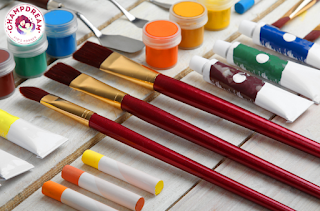Art Therapy: 4 Benefits in a Kid’s Life
Art Therapy: 4 Benefits in a Kid’s Life
Arts are extremely strong, magnificent as well as therapeutic.
The arts allow children to express themselves and their thoughts without having to put them into words, whether they are acting in a play, singing a song, dancing, drawing a picture, or writing a poem. This is only one of the numerous reasons why youngsters have taken part in various kinds of art therapy.
What is art therapy?
Any combination of dancing, writing, visual arts, drama, music, or other creative endeavors is referred to as art.
These approaches are combined in art therapy to promote individual development and growth. The correct combination can help you feel better overall by reducing anxiety and stress, increasing self-awareness and self-esteem, building relationships, regulating habits, and enhancing social skills.
This sort of therapy has also been demonstrated to assist children and adults cope with a variety of issues, including disability, anxiety, and trauma. Art therapy helps people release and express sentiments they might not be able to convey otherwise through education and conversation.
J.K. Rowling, one of the most well-known authors in the world, admitted to being depressed while writing the first Harry Potter novel. In the guise of the Dementors, the guardians of Azkaban Prison who feed on human happiness, she constructed a fictitious portrayal of her despair. Rowling was said to have been in art therapy for a long time. Even after she'd achieved enormous success, she continued to seek help, which included art therapy.
Advantages of Art Therapy
Creates a tranquil environment
Children of all ages, both with and without special needs, have a voice even if they lack the verbal skills to express themselves. Arts stimulate a child's imagination and inventiveness, allowing him to learn about himself and how to use his senses. They also give the body a sensation of serenity and have a favorable impact on the mind, perception of the environment, and emotional state.
Boosts Creativity
Pouring down their feelings into a poem, or painting a thought, or dancing their heart out to their favorite music accelerates your child's creativity through a fun activity, which helps youngsters recover and grow faster.
Arts aren't merely for coping; they also have a significant impact on a child's normal growth.
Fosters social skills
The importance of developing social skills at a young age cannot be overstated. As adults, children who are at ease in social situations perform considerably better because they develop connections, communication, and empathy. It teaches youngsters to value differences among people and to embrace the perspectives of each individual.
Many arts can be practiced in groups, such as online dancing lessons, art classes, or chess classes, where children must work together, learn to share, and accept responsibility for how their actions influence others.
ChampDream offers online classes in every type of art, from painting to dancing, all from the comfort of your own home.
Contributes to emotional development
Art therapy can help children develop and better understand their feelings in addition to providing an emotional release. Being angry or hurt is difficult to express in words, but a youngster can express these feelings through a drawing, poem, or dance, making it easier for themselves and others to understand.
Children's confidence grows as a result of their participation in creative activities. It's a technique to start a conversation on difficult-to-deal-with problems. It can be both therapeutic and insightful for them to express their emotions creatively.
Final Thoughts
Encourage your kids to express themselves artistically and creatively. Take a minute after completing a creative assignment to discuss what was accomplished and how the child feels about it. Asking inquiries shows the child that you care about what they've done. It is critical to include the arts in your young child's life for his or her overall development.
Encourage your kids to express themselves artistically and creatively. Take a minute after completing a creative assignment to discuss what was accomplished and how the child feels about it. Asking inquiries shows the child that you care about what they've done. It is critical to include the arts in your young child's life for his or her overall development.
What do you think?
Now we ‘do like to hear from you
- What kind of art therapy do you prefer for your children?
- Was art therapy beneficial for your child?
- What are your recommendations or suggestions on this topic?





Comments
Post a Comment